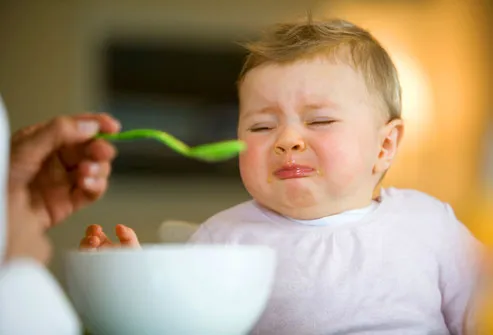 In a bid to make their child appear ‘ chubbier’ than other kids, parents in UK may be feeding their babies and toddlers larger portions than they need for their nutritional needs.
In a bid to make their child appear ‘ chubbier’ than other kids, parents in UK may be feeding their babies and toddlers larger portions than they need for their nutritional needs.
A study has found that overweight children between the age of four and 18 months old eat similar food to healthy weight children but have bigger portions as compared to healthy weight children.
Report author Hayley Syrad, from University College London, said,
“The research suggests eating frequency is having no impact on weight and it’s not that parents of larger children are giving them an extra Mars bar or apple – it’s that their portions are bigger.”
The report by the University College London said that parents may not realise how much their young children should be eating. The parents may also not realise the dangers of children being overweight.
Overweight children eat larger meals
For the study, the researchers analysed data from a UK survey being presented at the European Obesity Summit in Gothenburg, Sweden.
The data looked at the eating diaries parents kept for 2,564 children. The diaries contained information on what children ate, how often they ate and the size of the portions of food they ate.
This data was studied by the researchers to compare the eating habits of overweight children to the eating habits of children with healthy weight.
The overweight children were the ones who were classed as being in the heaviest 15% in their age group.
The report found that overweight children were consuming larger meals than their healthy weight counterparts.
The researchers said that for every extra 24 calories consumed during each meal by the child, there was a 9% increased risk of becoming overweight or obese.
Ms Syrad said the results of the research suggested some parents may be overfeeding their infants because they believe that it is healthy for babies to be “chubby”.
She added,
“We know that even birth weight tracks into later life. If children are overweight when they are under two it tracks into adulthood.
“A bigger baby is likely to be a bigger child and then a bigger adult.”
Responsibility of ‘parents’
Judy More, a nutritionist and paediatric dietician, said some parents might be overfeeding their babies and young children out of fear that their children may be underfed.
“It’s the parents’ responsibility to provide nutritious food, but they should allow children to eat as much they want to,” she said.
She asserted that healthy weight infants and young children should eat until they are full rather than being made to finish everything on their plate.
The study asserted that feeding guidelines for infants and children needed to be more specific and better known.
Ms Syrad said that eating guidelines for infants and toddlers should be more specifically catered to smaller age ranges.
She also said that future research should focus on how food intake affects the weight of children as they get older.
